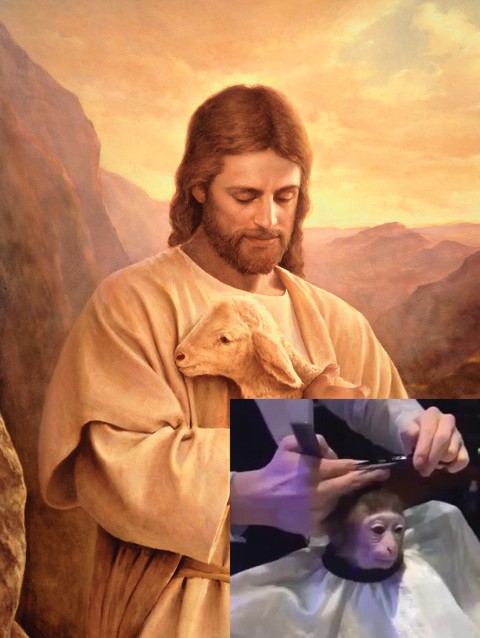Softly and tenderly Jesus is cutting a tiny monkey’s hair
I love the Del Parson Jesus. But it's the Monkey Jesus I need now.

I first encountered the “Monkey Jesus” at two in the morning, lying in bed, dead-eyed, my small zombie thumb scrolling through memes. One of those memes features an image of a monkey getting a haircut superimposed on pictures of a variety of famous figures—including Jesus. When I saw the solemn, little monkey face patiently sitting through a seemingly routine haircut with Jesus as barber, the electric strangeness of it startled me out of the mindless inhale of Internet images. The oddity and tenderness of it all felt so familiar. The image visually reconciled the conflicting impulses I had felt within myself for so long: it embodied the tug between the sacred and perverse and puerile.
The image of Jesus was from The Lost Lamb, a painting by the Mormon artist Del Parson. I know this because I am Mormon and because the artist’s son Craig and I used to skip class as undergrads to sit on the grass and goad each other into arguments over campus fashion. I’ve seen The Lost Lamb all my life. My Sunday school teachers held it in front of me and used it to teach me about love. As a missionary, I stood in a Costco parking lot with shredded pride and passed out small cards of the painting to shoppers who sidestepped the salvation I offered. I’ve seen Parson’s painting framed in church hallways in London, Honduras, Sydney, and San Francisco. Wherever I go, there it is, winking at me like a heavily perfumed woman in the checkout line, and every time I’m unsure of the secret we share.
Read our latest issue or browse back issues.
The Del Parson Jesus is the Savior of the American suburbs. He’s clean, has kind eyes, is masculine, yet still a good listener. He’s a Jesus I would trust to water my plants. The ravages of time, the communal ache of the living, the scourge of Calvary have left little effect on his face. And it was this Jesus I had in mind when, as a pious and nervous child living amidst my fractured family, I knelt beside my bed and pleaded for the powers of heaven to calm the blurry intensity of my eight-year-old fears. I trusted this soft-faced Savior completely. That he would heal my mother’s heavy heart, my parents’ knotted marriage, and the sardonic chill of my siblings I had no doubt. And in my hope, I did receive something like comfort. And for this, I love you, Del Parson.
But it is the Monkey Jesus I need now.
I was raised with an odd constellation of values. My parents, who never spoke to one another and were religiously divided, prayed seriously on their own and taught me to do the same. Alone, they read scripture in earnest and dressed well for church. On Sundays, my mom took her children to the Mormon ward while my dad sang with his congregation, which was part of the United Church of Christ.
Though sincere and serious in their separate faiths, in our home they didn’t allow the sentimentality and emotional incontinence sometimes found among the religious. Irony was the air we breathed. Sometimes we used it as a method of protection, sometimes as a tool to enter life more closely. In our mutual teasing of the world, the divisions of our family could momentarily fade. Nothing was immune from our jokes. As teenagers, my brother and I held entire conversations in the personas of overly supportive dads, hockey moms, religious leaders, or anyone else we found to be fitting too comfortably into their type. We could be brutal. The words of my mother still spin in my ears: “I don’t criticize, I comment.” But the line is thin.
Our sensibilities didn’t always translate smoothly at church. In a world of wholesome families and religious kitsch, of flaccid handshakes and proclamations of a perfect knowledge of God’s will, I felt cast out. And like most people who feel alienated, I pressed against what pressed me. When I was eight I was asked to leave Sunday school for insulting my teacher’s tasseled loafers. I wandered the halls only to find my brother doing the same. We sat in the parking lot and ate Starbursts, and that night I prayed to God to make me “less unruly.”
Of course, within this prayer was the greater plea for peace. I was tired of bucking and anxious to find somewhere to rest. How could I make myself more fitting, gentler, less unruly? I spent most of my youth flailing inside of these questions until slowly the thrashing formed into something graceful and good. In the radiance and invitation of a fragmented world, I began to find my place. My faith is untidy. I love what is unkempt. I encounter Christ in incongruity. Every human interference of the sublime points to a world in need of Christ, and thus points to Christ. I’m saying my heart must break before it can be healed. I’m saying if the choir’s voice cracked during Handel’s Messiah, how much more palpable Christ’s presence. Perfection precludes grace.
To see Christ and monkey paired is an intrusion that renews. It propels me toward innocence and expands my tired realms of worship. Because I long for Christ, I look for him in all aspects of the Taco Bell and Netflix world I live in. I search for what John of Damascus calls “analogies of faith,” the shadows and signs of his virtue in an unbalanced world. In the tourist’s flip-flops slapping through the Notre Dame, in the bathroom with my sick friend watching Martin Luther documentaries, in the marbled Christ standing stoic amid the Mickey Mouse lights of the street fair, I look for what poet Charles Wright calls “outlines of the infinite.” But I must take care not to worship the likeness of Christ alone. I do not worship incompleteness, I long for wholeness, but I live in incompleteness and must find Christ there.
Del Parson’s manicured Christ, I worry, contains and limits him. How could this infantilized Christ understand, let alone heal, the manic, crooked-toothed world? Is it not a tepid template, a sterilization of the mad, ragged Christ who knows how the world’s textures uproot and elevate and hurl us back down into earth again and again?
Perhaps it is unfair to slander The Lost Lamb and exalt Monkey Jesus when both images display the blindness and desires of their context, when both images crave Christ and make of him what they can. But if, as Thomas Merton says, “the humble man takes whatever there is in the world that helps him find God and leaves the rest aside, [and] sees clearly that what helps others to be saints might ruin him,” then I will cling to Monkey Jesus and seek my least ruinous path to Christ.
Most truth is encased in broken bodies. My family, my church, myself, all suffer illness. But I honor the bodies I’ve inherited. They are the homes within which I first encountered Christ. In their enclosures I am hurt and healed and hurt and healed. And in this pattern, I become a kind of always convalescent, who Baudelaire says, “like the child, is possessed in the highest degree of the faculty of keenly interesting himself in things, be they apparently the most trivial.”
“Apparently the most trivial,” meaning, perceived as trivial but not at all so. I know this Jesus monkey meme was made mockingly. Memes, as a genre, venerate the inane by reinventing it. They revel in the banal and exploit the collective ennui of my generation. This is true. But they also are meaning-making machines perceptively confronting modern existence through image and language to create emotional and intellectual complexes akin to poetry. They are born of the contradictions and confusion we encounter daily.
The Monkey Jesus meme turns the savior of humankind into something absurd. But I believe the sacred and absurd reside nicely in tandem, offering greater life to the other. Surrendering to the disconnection I so often experience in the world and acknowledging its humor can be a radical act of faith. That someone thought to film a monkey in a barber’s chair, that another person across the world knew both this video and Parson’s painting and imposed one over the other, making Jesus not only the rescuer of the lost sheep but a skilled barber to a common jungle animal, testifies of a world so elegantly confused, so wildly intimate, so communally in cahoots, I have no choice but to say hallelujah.
A version of this article appears in the print edition under the title “Monkey Jesus.”





